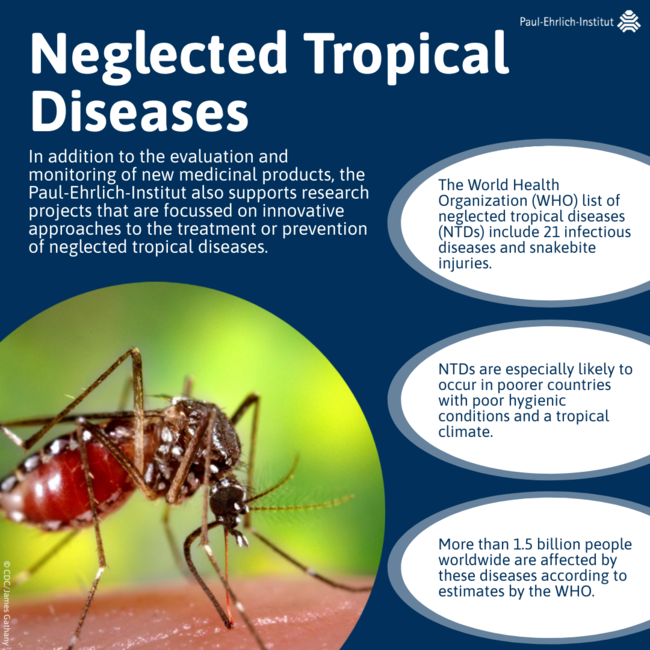Paul-Ehrlich-Institut Supports World Neglected Tropical Diseases Day
The World Neglected Tropical Diseases Day will be celebrated worldwide on 30 January 2025. This campaign was launched by the World Health Organization (WHO). The WHO's list of neglected tropical diseases (NTDs) include 21 infectious diseases and snakebite injuries, which are especially likely to occur in poorer countries with poor hygienic conditions and a tropical climate. Among the infectious diseases included are African sleeping sickness, leishmaniases, rabies, dengue fever, and chikungunya fever. More than 1.5 billion people worldwide are affected by these diseases according to estimates by the World Health Organization. Neglected tropical diseases are also becoming increasingly relevant in Germany and Europe. One reason for this development is the fact that climate change promotes the spread of disease carriers such as mosquitoes. On the occasion of World Neglected Tropical Diseases Day, the Paul-Ehrlich-Institut (PEI) would like to emphasise the importance of research and development of innovative medicinal products as well as international cooperation in the fight against these globally widespread but often overlooked diseases.

 Neglected Tropical Diseases.
Source: Paul-Ehrlich-Institut
Neglected Tropical Diseases.
Source: Paul-Ehrlich-Institut
Scientific Support, Authorisation, and Monitoring of Innovative Medicinal Products
Neglected tropical diseases endanger global health. Many patients die from these diseases or suffer permanent damage. One of the main reasons for the high burden of disease is the lack of medicines and vaccines. As the Federal Institute for Vaccines and Biomedicines, the Paul-Ehrlich-Institut is significantly involved in the evaluation, authorisation, and monitoring of new medicinal products, some of which are also being developed for neglected tropical diseases. For example, vaccines against chikungunya fever and dengue fever have been authorised in the European Economic Area (EEA) in recent years. "The development and authorisation of new vaccines against chikungunya fever and dengue fever shows the progress we can make through modern biomedical research. These successes illustrate that global challenges such as the fight against neglected tropical diseases require joint action in the scientific, regulatory, and political fields,"
emphasised Professor Stefan Vieths, President of the Paul-Ehrlich-Institut.
Research at the Paul-Ehrlich-Institut
In addition to the evaluation and monitoring of new medicinal products, the Paul-Ehrlich-Institut also supports research projects that are focussed on innovative approaches to the treatment or prevention of neglected tropical diseases. One such project is being carried out in the Immunology Division. Researchers there are investigating Leishmania parasites, which can cause the tropical disease leishmaniasis, in order to determine new targets for the treatment of leishmaniasis. Work is also underway to modernise microscopy with a focus on neglected infectious diseases and imaging techniques to identify new target molecules. The Paul-Ehrlich-Institut's research ensures the high level of technical expertise required for a reliable evaluation of complex biomedicines.



